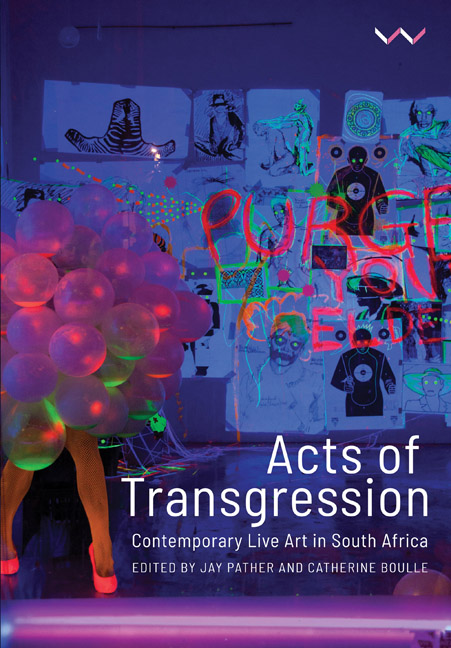Book contents
- Frontmatter
- Contents
- Acknowledgements
- Introduction
- PART ONE LIVE ART IN A TIME OF CRISIS
- PART TWO LOSS, LANGUAGE AND EMBODIMENT
- PART THREE RETHINKING THE ARCHIVE, REINTERPRETING GESTURE
- 9 don't get it twisted: queer performativity and the emptying out of gesture
- 10 Performing the Queer Archive: Strategies of Self-Styling on Instagram
- 11 Effigy in the Archive: Ritualising Performance and the Dead in Contemporary South African Live Art Practice
- PART FOUR SUPPRESSED HISTORIES AND SPECULATIVE FUTURES
- Contributors
- List of Illustrations
- Index
11 - Effigy in the Archive: Ritualising Performance and the Dead in Contemporary South African Live Art Practice
from PART THREE - RETHINKING THE ARCHIVE, REINTERPRETING GESTURE
Published online by Cambridge University Press: 30 May 2019
- Frontmatter
- Contents
- Acknowledgements
- Introduction
- PART ONE LIVE ART IN A TIME OF CRISIS
- PART TWO LOSS, LANGUAGE AND EMBODIMENT
- PART THREE RETHINKING THE ARCHIVE, REINTERPRETING GESTURE
- 9 don't get it twisted: queer performativity and the emptying out of gesture
- 10 Performing the Queer Archive: Strategies of Self-Styling on Instagram
- 11 Effigy in the Archive: Ritualising Performance and the Dead in Contemporary South African Live Art Practice
- PART FOUR SUPPRESSED HISTORIES AND SPECULATIVE FUTURES
- Contributors
- List of Illustrations
- Index
Summary
Our knowledge of the dead comes to us predominantly through our encounter with the archive or, more specifically, our encounter with two particular archival sources. The first is the written archive, where the traces of the dead (transformed into documents) are preserved as a means to store knowledge from the past for access in the future. The second source is the body, occurring through our memories and complex genealogies, by which traces of the dead are passed down from generation to generation through the gestures, stories and practices of our cultures and the cultures of our ancestors. Both the embodied and written archives are spaces where we commune with the dead and are able to apply their knowledge from the past to our discovery of new knowledge in the present.
Within the embodied archive, the performance of cultural ritual emerges as a particularly significant example of the passing down of knowledge through inherited and learned behaviour. Ritual theorist Catherine Bell loosely defines ritual as a series of embodied activities that are perceived to transcend the present by connecting to values, knowledge and traditions that are regarded as ancient and/or timeless.1 In passing down these ritual behaviours from one generation to the next, importance is often placed on their continued repetition and restoration in a markedly similar way through their framing as ‘sacred’ activities. Towards this end, often strict socio-cultural rules and regulations regarding who can perform the ritual, how it must be performed, as well as where and when the ritual can occur, serve to limit and govern the manner in which the behaviour is passed down and restored in future generations. Through this socio-cultural framing, ritual behaviours become imbued with both the knowledge of the past as well as those ideological belief systems from which this knowledge emerges.
The creative reimagining of ritual behaviours through performance thus becomes an exploratory methodology for unearthing new knowledge and insight from the archive through the disruption, subversion and challenging of old knowledge inherent in the rituals themselves. This proposition that new knowledge is gained through interrogation of the old is the point of departure that guides the discussion that follows.
- Type
- Chapter
- Information
- Acts of TransgressionContemporary Live Art in South Africa, pp. 243 - 264Publisher: Wits University PressPrint publication year: 2019



